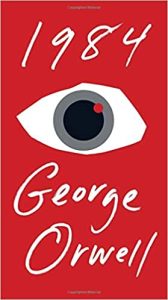1984, written by George Orwell and originally published in 1949, is considered by some one of the most well known and popular dystopian science fiction books of all time. I chose to read 1984 because I have been told by multiple people that I need to read it eventually and it also relates to the world today in an eerie way, especially with current events. The book is about a man named Winston Smith who discovers he is not satisfied with the government Big Brother’s constant surveillance and control of society. He finds a way to rebel and falls in love with a woman named Julia, only to end up being captured, tortured, and eventually brainwashed into loving Big Brother. 1984 is considered soft science fiction since it mostly deals with a society and it’s dystopian government’s political aspects and control over the people it rules, and though technology is not unbelievably advanced, it’s surveillance ability is heavily abused. This book is very fascinating because of the parallels found to today’s current society. It depicts a government and society similar to one that could be found in reality, the main difference being that the control those in the upper class have is not only evident all the time, but is also absolute. Winston’s job involves rewriting journals, books, and other sources to make Big Brother’s predictions of the future always accurate and even change the occurrence of events in accordance with what Big Brother wants. The story is a haunting depiction of what could happen if those in power decide to exert more control and instances of this occurring can be seen on a smaller scale in real history and the present, and I would definitely recommend it because of how creative yet accurate and ultimately hopeless the tale becomes.
Orwell, George, and Erich Fromm. 1984. Signet Classics, 2017.


